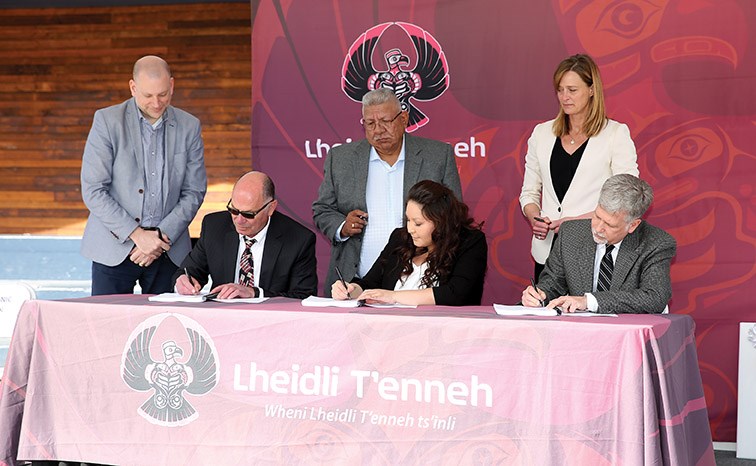The Lheidli T'enneh First Nation, along with the negotiators from the Canadian and British Columbian government initialed the Lheidli T'enneh Treaty Saturday morning at the Civic Centre Plaza, which ratification vote takes place in June.
Dominic Frederick, Chief of Lheidli T'enneh First Nation, said he'd like a yes vote from his people when it comes time.
"To the Lheidli T'enneh the treaty means we're moving ahead and building our future for the next generation," Frederick said. "I am hoping for a yes vote so our community can come together and I hope people realize we can't stay with Indian Affairs and the Indian Act and we have to start somewhere. People are saying 'it's not the right time' - there never is going to be a right time but I'm saying it's the right time now."
In attendance on what was often called an historic day was Joe Wild, senior assistant deputy minister, treaties and aboriginal government, Indigenous and northern affairs Canada, who was witness to initialing by Frank Soda, director of negotiations for the Government of Canada. Robert Leece, senior negotiator for the government of British Columbia, whose initialing was witnessed by Trish Balcaen, chief negotiator at ministry of Aboriginal relations and reconciliation, Chief Dominic Frederick who witnessed initialing by Tamara Seymour, treaty community engagement manager for the Lheidli T'enneh.
During the many speeches offered by those who initialed the treaty, another speaker offered his perspective.
Tom Happynook, treaty commissioner for British Columbia, spoke about being on the other side of treaty negotiations as Huu-ay-aht First Nations treaty implementation team leader. Happynook talked about how after successfully negotiating their treaty and voting yes, the Huu-ay-aht First Nations were able to purchase businesses in their region to offer youth gainful employment that sees a living minimum wage of $17.22 per hour and those seniors 60 years old and older get a $200 cheque at the end of each month to ensure ends meet.
"I'll be 60 in October," Happynook grinned.
"This is another big step in the journey for the Lheidli T'enneh and I want you to know you are not alone any more," he said to the Lheidli T'enneh people who were amongst about 60 people attending the initialing Saturday. "Your improved treaty is a living breathing document. It's a new relationship with the governments of Canada and British Columbia. Your treaty will allow you now to protect your lands and to have a say within your whole territory. You're going to be able to take care of your people who live away from home."
Happynook said he wanted to encourage the Lheidli T'enneh people to vote in June.
"To make meaningful change and changes to your lives you have to make courageous and bold decisions," Happynook said. "There is a new day on the horizon so make sure you get out to vote and make sure you think of your future generations."
The initialed treaty has been updated since 2006 when it was voted down.
One important change to the wording in the treaty allows for ongoing amendments to reflect developing provincial and federal policies regarding reconciliation and treaty negotiations.
The Lheidli T'enneh Treaty will see a capital transfer of $37.1 million take place upon a yes vote, which is an increase of $20.8 million offered in the 2006 agreement.
The treaty would provide the First Nation with rights and benefits regarding land, resources and self-government.
Terms of the treaty include:
* 4,330 hectares of treaty settlement lands, known as Lheidli T'enneh Lands, including approximately 1,183 hectares of Lheidli T'enneh Lands, which would be located within the City of Prince George. Lheidli T'enneh is working with the city and the regional district to develop a planning agreement;
* $37.10 million capital transfer;
* $502,000 per year for 50 years in resource revenue sharing (indexed to inflation);
* $2.29 million per year in ongoing funding for services such as health, education and social development, and for governance activities (indexed to inflation);
* $15 million in one-time funding for implementation, fisheries and capacity building;
* $1.69 million in one-time funding for an economic development fund;
* $100,000 annually for a community development officer;
* The treaty protects the rights of Lheidli T'enneh citizens to hunt, fish and gather throughout defined traditional harvest areas.
Lheidli T'enneh First Nations people are able to vote in a number of way with the main vote taking place June 16 to 23, with options of mail-in ballot and online voting. For more information visit www.yourvoiceourfuture.ca.



